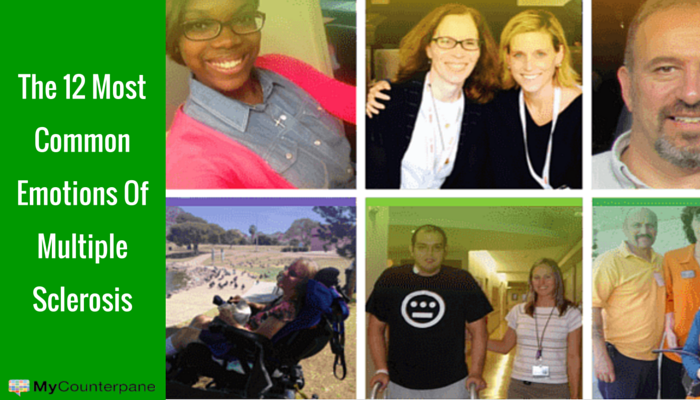
For those who are diagnosed with multiple sclerosis, life can be an emotional roller coaster. The physical toll MS takes on the body is huge, and the emotional aspects of living with MS can be just as challenging. Emotional lability is real and the 12 most common MS emotions displayed have been gathered and listed below as a way to help you.
Sometimes it is difficult to put what you’re experiencing into words. However, learning to express your emotions and documenting the highs and lows of your life with MS can have healing power, not only for yourself but others as well: When you share what you’re going through with others, they can benefit from your experiences.
Below are the 12 most common MS emotions that come with the ups and downs of life with MS. Read on to see if you relate and leave a comment if you’be experienced an emotion that is not on the list.
1. Overwhelmed: The Most Common MS Emotion
Feeling overwhelmed is one of the most common MS emotions experienced by those who have just been diagnosed with MS, and even those who have been living with the disease for years.
From coping with a new diagnosis and trying to understand what MS means, to selecting a therapy and a trustworthy neurologist, you may feel like you can’t bear to deal with one more thing. Sharing your feelings with other MSers is a great way to cope with overwhelming emotions. And just know, you will figure it out.
2. Aware
The feeling of awareness comes in many forms-like becoming aware of your new normal, to being aware of when you’re having a bad day. This emotion empowers you to make positive decisions for your life. Even if you are unable to make the positive change today, awareness will guide you through your life with MS, offering stability in a surprising way.
3. Guilty
Guilt is an all too common feeling and also comes in many forms. You may feel guilty about the things that you’re no longer able to do for yourself and your family. You may feel guilty about the way MS affects your relationships with loved ones or co-workers. You may feel guilty about bad habits that worsen your MS symptoms. There will be days where there’s a list of things to feel guilty about, but we encourage you to limit it and know it’s not your fault. You are one person and you can’t do it all. The fact is, no one can.
4. Determined
There will come a time in your journey when you no longer want to feel guilty or overwhelmed. When that time comes, determination can be a powerful motivator. Whether you’re determined to make a difference within the MS community, or simply feel determined to get out of bed on a bad day, determination can be the driving force to help you get through the day and your life living with MS.
5. Scared
You just got diagnosed with MS and you’re scared. Join the club! There are so many reasons to feel scared when you learn that you have MS. The fear of the unknown; the fear of treatment options or lack of treatment options; the fear of how your life will/has changed forever following a diagnosis. Overcome that fear with the knowledge that there are people who have been through it and have been able to find a balance between their illness and a happy life.
6. Sad
Feelings of sadness can stem from mourning the life you had before your diagnosis (the things you have had to give up because of MS), to dealing with the daily struggle of living with your symptoms. This is perfectly normal and there’s enormous power in recognizing it in a way that people can work to make you feel better.
7. Hopeful
Hope is a great feeling! It can come from a new treatment that works well, the news of promising new research, or having MRI results that come back with NO NEW LESIONS! Feeling hopeful is a sign that you’ve taken more control of your life with MS and that you can have some control despite the unpredictability of living with MS.
8. Stable
Stability is a wonderful feeling that can come from your MS being in remission or from realizing that your day-to-day routine won’t be affected by your symptoms. You may also feel stable after you’ve coped with the negative emotions that come with an MS diagnosis. Stability is not something you often think of when you’re first diagnosed with MS, but a place you arrive during the course of your journey.
9. Lonely
It’s so easy to feel lonely when living with MS, even if you’re surrounded by caring friends and family. No one, even other people with MS, can truly understand what your life is like and this is isolating. Speaking to others living with MS can help you feel less lonely and forms a community of people who get you. Joining an online community like MyCounterpane can introduce you to people who have gone through what you’re going through and that is a huge (and scientifically proven) asset to your emotional health.
10. Happy
Happiness can come in many forms and for many reasons. From the joy of accomplishing a small task on your own to the wonderful feeling of having a great day when symptoms don’t affect your tasks, recognizing these moments of happiness will lead you to other happy moments. In the presence of each of the MS emotions, happiness can shine. Be present and embrace the positive MS emotions!
11. Angry
Anger can come from something as small as experiencing muscle spasms to feeling anger about the all the ways your life has changed since your diagnosis; feeling it is normal. This is a stop on the journey of accepting your new life with MS, but it doesn’t have to be a place where you set up permanent residence.
12. Depressed
Feeling depressed is one of the most common MS emotions you’ll experience with MS. It’s all too easy to retreat into yourself and feel like there’s no hope for your life outside of your MS diagnosis. Feeling depressed can lead to depression, which is a common symptom felt by many with MS.
The fact is, MSers are more prone to depression than those who don’t have MS due to the fact it can come on as a symptom of your MS. To learn more about MS and depression, check out and interview between MCP Founder Kate Milliken and Johns Hopkins neuropsychiatrist Dr. Adam Kaplin who discuss MS and depression and how you can cope and overcome those feelings.
____________________________________________________________________________________________________
If you find yourself experiencing any of the 12 MS emotions listed above and want to connect with others who have felt the same way, log into MyCounterpane and start sharing your feelings today. Click here to read about how to share on MyCounterpane or watch this quick video that explains the process.
Whether you share your moments on MyCounterpane with the community or privately, the health benefits of journaling are real. Click here to read our post, Top 10 Reasons Journaling Improves Your Health, According To Science, to learn more about how you can heal yourself through the power of journaling.


